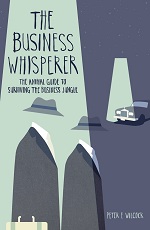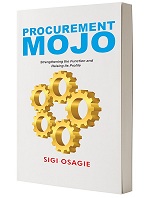Alumni Book Reviews
The Business Whisperer, Peter E Wilcock
Reviewed by Tom Mullen
The Business Whisperer by Peter Wilcock includes a series of stories that are about business, but relate to the world of animals. These are told by a mysterious American business guru named Exley to a man named Joe, who is wrestling with how he can create his own wealth in life.

The book is compelling because rather than including chapters listing bullet points on actions to take in the world of business, it is intriguing story peppered with instructive anecdotes. It begins when the narrator, Joe, finds a 1965 Rolls Royce Silver Shadow broken down on a rural roadside in a rainstorm. Joe offers to deliver the stranded driver, Exley, to a hotel for the evening, and the adventure begins.
“Too many people spend their precious time on this planet fighting life’s natural flow, stressed and in conflict with others,” Exley tells Joe. This sentence provides a premise for the stories that follow – which highlight how business - like life - is a flow of energy, events, and people, which should be cooperated with, rather than wrestled against.
One lesson that Exley tells Joe involves the Camel in the Tent. During one cold night in the desert, in order to get warm, a camel asks its master if it can just put the tips of its ears in the tent to stay warm. The master agrees. Later, the camel asks if it can poke its entire head in the tent, which the master reluctantly agrees to. This goes on through the night, until in the morning the camel has moved completely into the tent to sleep. The lesson? As Exley explains: “…the way to achieve a goal can be in stages.”
When Joe’s wife Louise listens to this story, she “was obviously captivated by our new acquaintance because he was actually talking about life, not just business…”
This is the magic of The Business Whisperer. It weaves instructional and entertaining anecdotes with a spiritual philosophy that life does not have to be a struggle, but a journey. If you are looking for inspiration and knowledge from an experienced executive, reading The Business Whisperer is a valuable use of your time. And that is important. As the author says: “This is the best advice I can give – just make the most of your time.”
About the Reviewer:
Originally from the United States, Tom Mullen gained a Masters degree in Civil Engineering at Newcastle University in 1995, several years before returning to the region to complete his Durham MBA. Tom has worked in a number of varied roles including as part of a Colorado mountain rescue and as an Engineering Manager for Creative Associates in Pakistan. Tom is author of 'River of Dreams' reivew in the the DUBS Alumni Magazine (Autumn 2014, Issue 26).
Procurement Mojo, Sigi Osagie
Reviewed by Barry Tuckwood
When you read a text book, how do you begin, even one intended to boost your motivation, do you read it from cover to cover or pick aspects from the index and contents that fit with your requirements? I expect that most of you do the latter, first checking that the text fits with some of what you think you know, and then learning from other aspects.
and contents that fit with your requirements? I expect that most of you do the latter, first checking that the text fits with some of what you think you know, and then learning from other aspects.
So I started with things I expected to find before turning to the introduction where there is a lesson on what matters most, not only for the book’s author but also for UK Plc. and for everyone who has any ambition in their career. For Sigi Osagie, the author, an immigrant to the UK, worked his way up from low-paid jobs to become a director in a major company. Here we have a lesson for all governments: they need to procure students, encouraging people like the author on their path to success, doing more to attract them as students at undergraduate and postgraduate levels. This applies whether they stay as the author has or they return to their home country with strong relationships from where they have studied and worked.
In this respect, countries are like businesses: they procure widely and should seek the best. Sigi Osagie shows us what can be achieved and why immigrants are important. Countries can attract those whom they need, whether that is to work or to study. As Sigi says about procurement, effective and efficient approaches are required.
Now to his main story: procurement mojo. We need only think of cartoon characters – Bristow, in Buying for Chester-Perry from, especially, Gun and Fames for example (http://www.guter.org/bristow/gunfames.htm), or the joke about any procurement executive being head of shopping – to recognise the changes that have been made over the past 25 years or so in recognising the value of procurement. Effective and efficient buying provides a direct impact on the bottom line. Effective procurement is far from the comedy image; it requires serious effort and can produce enormous benefits.
Sigi makes a strong point that a procurement leader is a business leader, not a purchasing geek. If the person who runs procurement is not working in the best interests of the company and its many stakeholders, they are not working effectively or efficiently.
I would have liked some of the tables and figures to be bigger, as some seem squeezed but if carefully applied they will be useful.
Procurement is fundamental to every aspect of the business. If the people who handle procurement follow the examples in the book they will earn the respect they hope for, particularly if they avoid any semblance of arrogance. There are lessons here for government as well as for companies and individuals. If people read, learn, adapt and apply, then, as Sigi Osagie intends, procurement will have its mojo.
About the Reviewer:
Barry Tuckwood has been a tutor on Durham’s MBA course since 1994, working on a number of courses and supervising dissertations. Based in London, he is an independent consultant specialising in strategy, change and project management.